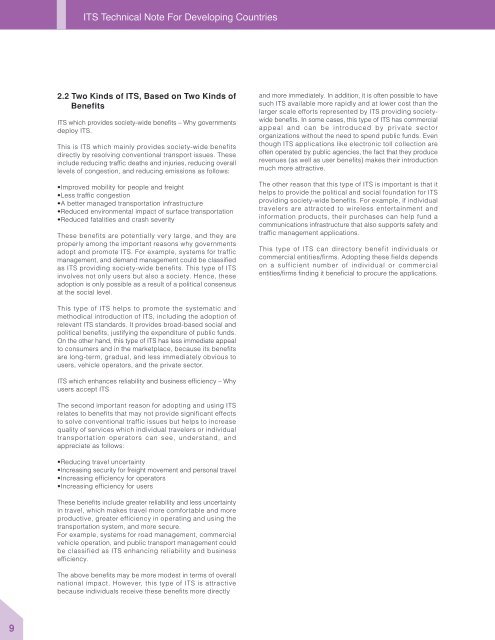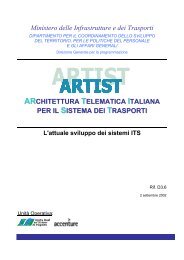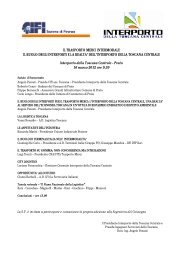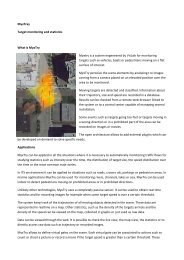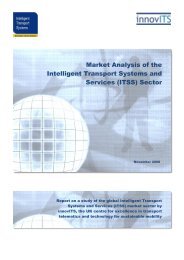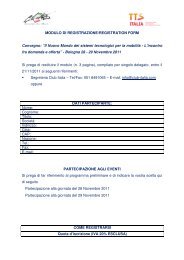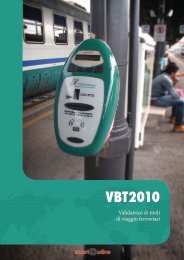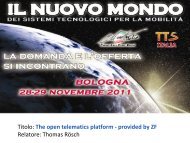ITS for Developing Countries ITS for Developing Countries - TTS Italia
ITS for Developing Countries ITS for Developing Countries - TTS Italia
ITS for Developing Countries ITS for Developing Countries - TTS Italia
Create successful ePaper yourself
Turn your PDF publications into a flip-book with our unique Google optimized e-Paper software.
<strong>ITS</strong> Technical Note For <strong>Developing</strong> <strong>Countries</strong><br />
2.2 Two Kinds of <strong>ITS</strong>, Based on Two Kinds of<br />
Benefits<br />
<strong>ITS</strong> which provides society-wide benefits – Why governments<br />
deploy <strong>ITS</strong>.<br />
This is <strong>ITS</strong> which mainly provides society-wide benefits<br />
directly by resolving conventional transport issues. These<br />
include reducing traffic deaths and injuries, reducing overall<br />
levels of congestion, and reducing emissions as follows:<br />
•Improved mobility <strong>for</strong> people and freight<br />
•Less traffic congestion<br />
•A better managed transportation infrastructure<br />
•Reduced environmental impact of surface transportation<br />
•Reduced fatalities and crash severity<br />
These benefits are potentially very large, and they are<br />
properly among the important reasons why governments<br />
adopt and promote <strong>ITS</strong>. For example, systems <strong>for</strong> traffic<br />
management, and demand management could be classified<br />
as <strong>ITS</strong> providing society-wide benefits. This type of <strong>ITS</strong><br />
involves not only users but also a society. Hence, these<br />
adoption is only possible as a result of a political consensus<br />
at the social level.<br />
and more immediately. In addition, it is often possible to have<br />
such <strong>ITS</strong> available more rapidly and at lower cost than the<br />
larger scale ef<strong>for</strong>ts represented by <strong>ITS</strong> providing societywide<br />
benefits. In some cases, this type of <strong>ITS</strong> has commercial<br />
appeal and can be introduced by private sector<br />
organizations without the need to spend public funds. Even<br />
though <strong>ITS</strong> applications like electronic toll collection are<br />
often operated by public agencies, the fact that they produce<br />
revenues (as well as user benefits) makes their introduction<br />
much more attractive.<br />
The other reason that this type of <strong>ITS</strong> is important is that it<br />
helps to provide the political and social foundation <strong>for</strong> <strong>ITS</strong><br />
providing society-wide benefits. For example, if individual<br />
travelers are attracted to wireless entertainment and<br />
in<strong>for</strong>mation products, their purchases can help fund a<br />
communications infrastructure that also supports safety and<br />
traffic management applications.<br />
This type of <strong>ITS</strong> can directory benefit individuals or<br />
commercial entities/firms. Adopting these fields depends<br />
on a sufficient number of individual or commercial<br />
entities/firms finding it beneficial to procure the applications.<br />
This type of <strong>ITS</strong> helps to promote the systematic and<br />
methodical introduction of <strong>ITS</strong>, including the adoption of<br />
relevant <strong>ITS</strong> standards. It provides broad-based social and<br />
political benefits, justifying the expenditure of public funds.<br />
On the other hand, this type of <strong>ITS</strong> has less immediate appeal<br />
to consumers and in the marketplace, because its benefits<br />
are long-term, gradual, and less immediately obvious to<br />
users, vehicle operators, and the private sector.<br />
<strong>ITS</strong> which enhances reliability and business efficiency – Why<br />
users accept <strong>ITS</strong><br />
The second important reason <strong>for</strong> adopting and using <strong>ITS</strong><br />
relates to benefits that may not provide significant effects<br />
to solve conventional traffic issues but helps to increase<br />
quality of services which individual travelers or individual<br />
transportation operators can see, understand, and<br />
appreciate as follows:<br />
•Reducing travel uncertainty<br />
•Increasing security <strong>for</strong> freight movement and personal travel<br />
•Increasing efficiency <strong>for</strong> operators<br />
•Increasing efficiency <strong>for</strong> users<br />
These benefits include greater reliability and less uncertainty<br />
in travel, which makes travel more com<strong>for</strong>table and more<br />
productive, greater efficiency in operating and using the<br />
transportation system, and more secure.<br />
For example, systems <strong>for</strong> road management, commercial<br />
vehicle operation, and public transport management could<br />
be classified as <strong>ITS</strong> enhancing reliability and business<br />
efficiency.<br />
The above benefits may be more modest in terms of overall<br />
national impact. However, this type of <strong>ITS</strong> is attractive<br />
because individuals receive these benefits more directly<br />
9


